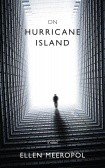
I’ve always been an avid reader, especially of literary fiction. While I enjoy escaping into a fun novel, most of my favorite books are anything but frivolous reads. Instead, they tend to fall into the category of political fiction, exploring how people deal with forces that are often beyond their control and require them to confront dilemmas with no easy solutions.
Since I started working at the RFC more than seven years ago, I’ve often found myself reading these novels from a new perspective. I wonder whether the RFC would fund that character’s daughters or what sort of questions our Board would ask about an application for support from that fictional young activist? And I see the faces of RFC grantees, real people I’ve come to know and care about, when I read fictional stories of people who suffer brutal consequences for their attempts to make their community, their country or their world a more just place.
So I guess it’s not surprising that I read, On Hurricane Island (the latest novel from my mother, Ellen Meeropol) from this perspective. On Hurricane Island tells the story of Gandalf, a math professor seized by government agents and taken to a secret civilian detention center on an island off the coast of Maine; one of her guards, Austin, a young woman desperate to save enough money to get out of her grandparents’ home and start her life somewhere else; Henry, the career agent in charge of the center who has his own secrets to protect; and Tobias, Henry’s second in command who knows he can break Gandalf if Henry would just give him the chance. Add in an approaching storm, a not-too-far-in-the-future major anniversary of 9/11, locals wondering what is happening on the small island with a dark history, and a young island woman and her love affair in 1914 with an immigrant stone cutter and union organizer, and there are plenty of characters to follow and wonder about.
The people of either extreme are the easiest to consider through the lens of the RFC. Norah, the committed activist whom Gandalf comes to know while in detention, seems like an obvious RFC beneficiary parent. And, on the other end of the spectrum, it’s hard to imagine any circumstance under which the Board would decide that Tobias is a targeted progressive activist!
But Gandalf, Austin and Henry raise more difficult and intriguing questions. Should someone who is targeted for who she knows receive support? What if she doesn’t consider herself an activist? If her children (if she had them) would not eligible for support initially, could that change if she is radicalized and moved to act by the targeting she experiences?
What about someone who works for a repressive organization, even if it gives him pause? If he comes to question what he’s willing to overlook and how far he’s willing to go to finally take a stand for his values, does that mitigate the bad choices he’s made in the past and the people he’s harmed? And what about a young woman who begins to question just “following orders” and act on those questions. At what point does she become an activist?
I found myself mulling these questions and wondering how I would vote if applications for the children of any or all of these characters were in front of me. The fact that I don’t have any easy answers is both a challenge of our work and one of the strengths of this intriguing new novel.
On Hurricane Island was just published this month; order it from your local independent bookstore or online from the publisher. After you read it, I’d love to hear your thoughts on both the novel and which characters’ children you think would or should qualify for RFC support. Post away in the comments below.
-------------
To receive a notification whenever there is a new post to this blog, subscribe now.

Comments
maybe this applies to some of your questions?
I just read a Malcolm X quote that applies a bit to some of your questions. Enjoy!
“Don't be in such a hurry to condemn a person because he doesn't do what you do, or think as you think or as fast. There was a time when you didn't know what you know today.”
I love it - don't you?